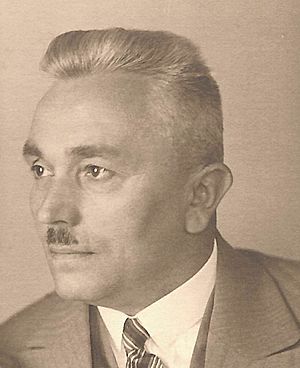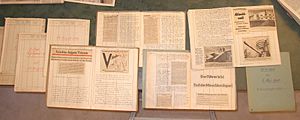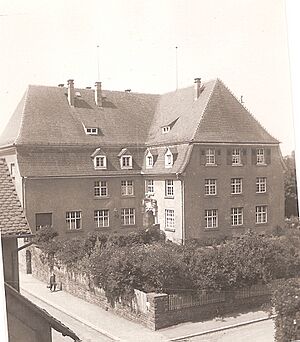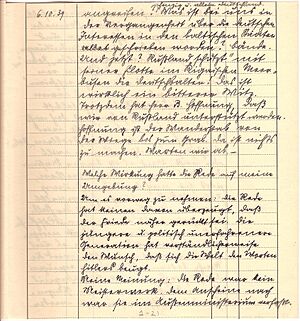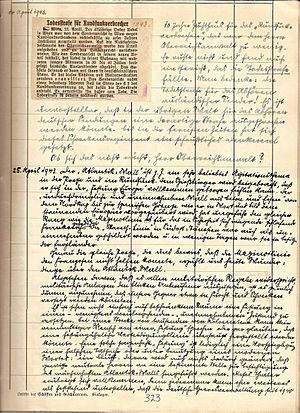My Opposition facts for kids
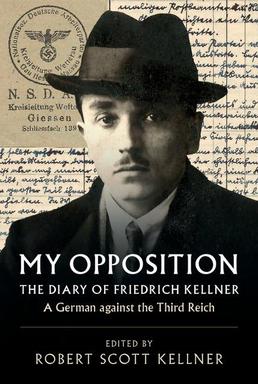
1st edition dust jacket
|
|
| Author | Friedrich Kellner |
|---|---|
| Original title | "Vernebelt, verdunkelt sind alle Hirne" Tagebücher 1939-1945 |
| Translator | Robert Scott Kellner |
| Cover artist | Rob Lock |
| Country | United Kingdom |
| Language | English |
| Subject | World War II diary |
| Genre | Historical diaries |
| Publisher | Cambridge University Press, Cambridge, UK |
|
Publication date
|
2011 German edition |
|
Published in English
|
2018 |
| Media type | |
| Pages | 520 |
| ISBN | 978-1-108-41829-4 |
My Opposition (German: Mein Widerstand) is a diary secretly written by Friedrich Kellner (1885–1970). He was a German social democrat, meaning he believed in fairness and equality for everyone. He wrote the diary during World War II to show what life was really like under Nazi Germany. He wanted to expose the lies (called propaganda) and the terrible actions of the Nazi government.
His diary has ten notebooks and is seen by historians as a very important historical record. The German magazine Der Spiegel said it showed a picture of Nazi Germany that had never been seen before. Kellner started writing on September 1, 1939, and finished on May 17, 1945.
In 1968, Kellner gave the diary to his American grandson, Robert Scott Kellner. He wanted his grandson to translate it and share it with the world. The diary was very long and written by hand in an old German style called Sütterlin script. Because of its size and the effort needed to read it, publishers were not interested for many years. But in 2005, former US president George H. W. Bush helped. He arranged for the diary to be shown at his presidential library. This brought the diary to public attention.
The diary has been shown in museums in America and Germany. Its first exhibit was at the George Bush Presidential Library in April and May 2005. This was to mark 60 years since Victory in Europe Day on May 8, 1945. The exhibit led to a partnership between Robert Scott Kellner and the Holocaust Literature Research Unit at the University of Giessen in Germany. They worked to publish the diary in Germany. In 2011, it was published in German under the title, Vernebelt, verdunkelt sind alle Hirne, Tagebücher 1939-1945. This means "Clouded, darkened are all of the minds, Diaries 1939-1945." Later, shorter versions were published in Russia and Poland. In 2018, Cambridge University Press published the English translation, My Opposition: The Diary of Friedrich Kellner -- A German against the Third Reich.
Contents
About Friedrich Kellner, the Author
Friedrich Kellner worked as a justice inspector in a courthouse in Mainz, Germany. He held this job from 1903 until 1932. During First World War (1914–1918), he was a sergeant in the German army. After the war, Germany became a republic. Kellner then became active in politics, working for the Social Democratic Party of Germany. He spoke out against the Nazis before they gained power.
When Adolf Hitler and the Nazis took control, they banned the Social Democratic Party. They also banned other political groups. Kellner was worried about his family's safety. So, he moved to the town of Laubach in Hesse. There, he found a job managing the courthouse.
On September 1, 1939, Hitler ordered the invasion of Poland. This was the start of World War II. Kellner began writing his diary that very day. He risked his life to write down the crimes of the Third Reich (Nazi Germany). He made a secret hiding spot in his dining room cabinet for his writings. Even though the SS (Hitler's secret police) watched him and questioned him, he kept writing throughout the war.
After the war ended, Friedrich Kellner became the deputy mayor of Laubach. He used his diary to help remove former Nazis from important jobs in the area. Then, he put his notebooks back in their hiding place. He also worked to bring back the Social Democratic Party. He was chosen as the head of the Laubach branch. He served Laubach as the first town councilman for many years. He stopped working in politics in 1959, when he was 74 years old. In 1968, he gave his diary to his American grandson.
Understanding the Diary
Kellner saw his diary as an answer to Adolf Hitler's book, Mein Kampf (meaning My Struggle). So, he named his diary Mein Widerstand, which means My Opposition. It has ten notebooks and 861 pages in total. Because there are many notebooks, people sometimes call it "diaries," but it's actually one big work. There are 676 entries, each with a date. The writing is in Sütterlin script, an old German handwriting style not used anymore.
The diary also includes more than 500 newspaper clippings. These are news articles, headlines, and army reports. They make the diary even more important for understanding history. There are also Kellner's extra essays, news from Nazi newspapers, and secret police documents about Kellner. Most of these were also handwritten in the old Sütterlin script. This meant they had to be copied into modern writing.
The huge amount of material made publishers hesitant at first. Professor Gordon Mork, a historian, thought a full publication might never happen. But when former president George H. W. Bush, who was a pilot in World War II, arranged for the diary to be shown in his library in 2005, it helped a lot. Unlike most diaries, My Opposition doesn't focus much on Kellner's personal daily life. Instead, it focuses on the bigger picture of the war and Nazi rule.
Why Kellner Wrote: A Call to Action
On September 17, 1939, Kellner thought about the bad choices Germans made after World War I. They elected Adolf Hitler and the Nazis, letting Germany become a country where the government controlled everything. He wrote:
We have now seen the start of two wars. Who can guess how this one will end? Because of what we learned from the war of 1914-18, my wife Pauline and I are very doubtful. A child who has been burned fears fire. What else could happen? Things we never dreamed of, things we didn't expect. The maps of the world have been messed up. Has no one even mentioned The Decline of the West? Who is to blame? The people who don't think! To crush democracy and give power to one man over almost eighty million people is so terrible. You can truly tremble about what will come. People let ideas be forced into their minds. They blindly follow every suggestion, let themselves be stepped on, hurt, tricked, worn out. And they must also, under national control, shout "Heil Hitler." One can only feel deep sadness in his heart about such a terrible time and about how patiently an entire population acts like sheep.
Kellner's diary criticized not only the German people who voted for Hitler. He also criticized citizens and leaders in other countries. These leaders did nothing even though they saw dictators in Germany, Italy, and Japan planning to take over the world. Kellner wrote that politicians in democratic countries failed to stand up to the dictators. He also pointed out that smart people, like university professors and doctors, accepted Nazi propaganda. He wrote on May 3, 1942, "Hitler fooled the whole world. He was incredibly lucky to meet weak and unsure opponents. They were cowardly people who didn't care about freedom or working together."
He especially couldn't understand why the countries that defeated Germany in the First World War watched without protest as Germany built up its army again. Kellner was also troubled by the Allies' slow response to the war. When Poland was attacked in 1939, followed by attacks on Denmark, Norway, The Netherlands, Belgium, and France, Kellner hoped the United States would help Europe. He couldn't understand why the United States waited so long to join the war.
Life Under Total Control
Kellner was very angry about the laws that controlled what people could say or hear. This control, called Censorship, was put in place by the Nazi Minister of Propaganda, Joseph Goebbels. All media—books, music, newspapers, and radio—were controlled. This was done to make Nazi power stronger and to stop any opposing ideas or information.
Two months before the war ended, on March 7, 1945, Allied armies crossed the Rhine River into Germany. Friedrich Kellner tried to explain why the German people themselves had not fought against Nazi rule. He explained why outside forces were needed to remove the harsh government they had voted for.
The path to ruin for the German people has arrived. Yet, the Party supporters still believe and hope. There are still those who refuse to see. They will hope for a miracle from the Führer right up to their funeral. In all other ways, the number of people who want peace grows every hour.
Future generations and other countries will never understand why the German people did not stop the Party leaders by force. They will wonder why Germans did not turn against the Party's harsh rule so this terrible war could end. To explain this, I would remind them that the number of Party members is very large. Especially the Party officials who have power. Plus, millions of people fully believed in the Nazi ideas. They were influenced by the Führer's radio talks and the Party's careful tricks.
There is no important job in the government or in private business that has not been filled by loyal Party members. So, wherever there might be a protest, a Hitler guard stands ready. And those in these jobs, who earn their living under Hitler, are certainly not against the Hitler system. They want victory, not Hitler's defeat. This is because they will lose everything if Hitler loses. Even if some of them, to hide their bad intentions, have treated people a bit more kindly.
Today our opponents are at the Rhine in the West, and at the Oder in the East. Still, I do not believe a collapse can happen from a public uprising. Without help from outside, it is not possible. Only the armed forces could truly end it. But there, a united will is missing. The important officers know, just like the Party officials, that they will be removed if the war is lost. Nazism and German military power will no longer exist. Therefore, the war continues until no more war actions are possible. The war will end when the German troops finally run out of bullets to fire at the advancing enemy.
That is how I imagine the war will end. The opponents must keep using their strength to end the war.
Publishing the Diary
- 2011 The full and final version of the diary was published by Wallstein Verlag (on German Wikipedia) in Göttingen, Germany. Its title was Vernebelt, verdunkelt sind alle Hirne, Tagebücher 1939-1945. It came in two hardback books, with 1134 pages and 104 pictures.
- 2014 The Russian magazine Inostrannaya Literatura (Foreign Literature) published parts of the diary. It was a long article of 40,000 words called "Odurachen v tret'yem reykhe" -- "Fooled in the Third Reich."
- 2015 A shorter Polish version was published by Karta Organization (on Polish Wikipedia). It included the first three notebooks of the diary. Its title was Dziennik Sprzeciwu: Tajne Zapiski Obywatela III Rzeszy -- Diary of Opposition: Secret Notes by a Citizen of the Third Reich.
- 2018 The English translation of the diary was published by Cambridge University Press. It was titled My Opposition: The Diary of Friedrich Kellner -- A German against the Third Reich. Robert Scott Kellner translated and edited it. It is one hardback book with 520 pages and 53 pictures.
Documentary Film About the Diary
CCI Entertainment, a Canadian film company, made a documentary film. It is called My Opposition: The Diaries of Friedrich Kellner. The film tells the stories of Kellner and his American grandson. It uses actors to show past events, along with photos and old film clips. During parts of the film, an actor reads from the diary. The camera also shows pages of the diary. The film was shown on TV in Canada in 2007. It was also shown at film festivals in the United States, Canada, and Israel. In November 2008, it was screened at the United Nations Headquarters in New York. This was to remember the 70th anniversary of Kristallnacht, a terrible event in Nazi Germany.
 | Percy Lavon Julian |
 | Katherine Johnson |
 | George Washington Carver |
 | Annie Easley |


